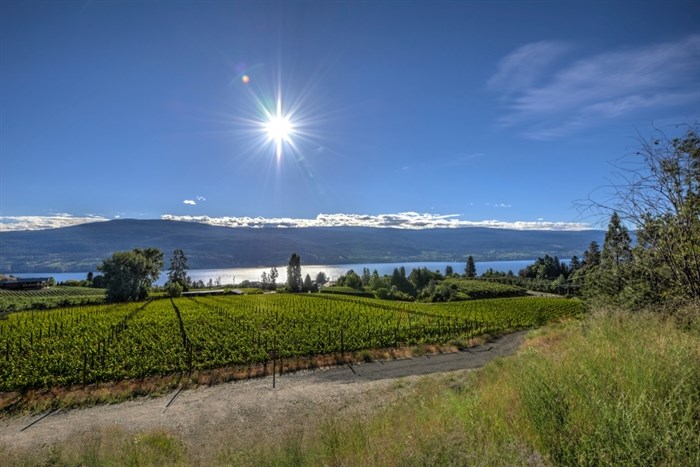How some Okanagan wineries are tackling climate change

Climate change presents a whole host of issues for the Okanagan’s wine industry.
From extreme temperatures, to drought, fire and smoke, innovative solutions will be needed to maintain the quality of Okanagan wine.
Christine Coletta, owner of the Okanagan Crush Pad in Summerland, told iNFOnews.ca that her business has been prepared for climate change since it opened in 2011.
“When we built the winery, we made it out of concrete so that it was resistant to fires. It also keeps the thermal mass in the building,” Coletta said. “So right off the bat... we factored in a lot of issues that we thought we would be facing with climate change.”
For twelve years the winery has been organic certified, meaning their inputs of chemicals and pesticides are minimized. It also joined the International Wineries for Climate Action a year and half ago and has committed to reducing its greenhouse gas emissions by 30% by 2030.
However, this year the realities of climate change were more than evident, with extreme wildfires and heavy drought. Coletta said the industry has seen the effects in multiple ways.
“People were told to stay away by well-intended government officials that were trying to clear hotel spaces,” Coletta said. “But the net result is that they told people to stay away for three weeks, and they did. They never returned.”
Not only were potential customers scared off by the fires, but a season of smoke would have also had a lasting effect on grapes in the region.
“There can be a layer of residue from the smoke… on the skins of the grapes. When you press that, those flavour components can mingle with the wine,” Coletta explained. “So as an industry, we've all been working very hard to make sure we know how to manage that. And we're not alone. Other regions around the world are also experiencing the impact of fires on their vineyards.”
Dr. Wesley Zandberg is a professor of Biochemistry and Molecular Biology at UBCO. His research has been focused on how wildfires and smoke affect wine grapes.
Dr. Zandberg said as far as mitigation goes, a pound of prevention is worth an ounce of cure.
“The best strategy is to devise a way to protect grapes out in the vineyard, either through a washing strategy or through protective application,” Dr Zandberg said. “And there's some promise there, although there's no clear product yet that works.”
Finding out the wine has been tainted at the end of production can be highly problematic. Wineries could either need to remove an entire crop or find a way to remove the offending molecules, Dr. Zandberg said.
“There are some interesting ways that wineries have come up with in the last decade or so to do that,” he said. “They're not perfect, but they're certainly improving steadily.”
These strategies include things like reverse osmosis treatments, filtration and pre-treatment to grapes before fermentation.
“I can tell you that I have had wine from side-by-side vineyards that have both been smoked in the same year and one product can be sold and one cannot,” Dr. Zandberg said. “So clearly, there are things that you can do in the winery that make a perfectly sellable product, even if it has been exposed.”
Exposure doesn't always lead to disaster. Sometimes smoke can produce an effect similar to an oak barrel, Dr. Zandberg said.
“Every one of those barrels is toasted on the inside to some degree by burning and that produces the same things that we find in forest fire smoke,” he said. “So, the pure presence or absence of a compound that's found in smoke doesn't necessarily guarantee the wine is tainted… So clearly we have to work side by side with chemists and sensory people to really carefully find solutions to this problem.”
Rising temperatures in the summer also may not be all bad news, Dr. Zandberg explained. It may actually yield some benefits for the Okanagan grape region.
“Heat makes grapes ripen faster,” he said. “That's actually maybe a net benefit for our region because we are typically one of the cooler grape producing regions in the world. So on that note, heat might be beneficial for us.”
Although her winery was built on climate-friendly principles, Coletta said her focus was also on keeping the land healthy for the future.
“(Our Italian Consultant) said that our job with our land was to keep it in great condition for the next generation,” Coletta said. “And I think that really stuck with me because we don't have a tradition and a history in North America of passing farms on through the generations like they do in Europe. We have a sort of a deplete-and-worry-about-it-later mentality.”
“Europeans are really ahead of us in terms of farm health and making sure that they are putting the land into highest and best use. Everything we've done since then has been to that goal, to that aim. It's important that we encourage as many wineries as possible to take a look at all aspects of their operation," she said. "We may not be able to impact climate change, but we can certainly influence our own practices and our own businesses to make sure that our footprint is as small as it possibly can be."
More information on the Okanagan Crush Pad winery can be found on its website here.
To contact a reporter for this story, email Georgina Whitehouse or call 250-864-7494 or email the editor. You can also submit photos, videos or news tips to the newsroom and be entered to win a monthly prize draw.
We welcome your comments and opinions on our stories but play nice. We won't censor or delete comments unless they contain off-topic statements or links, unnecessary vulgarity, false facts, spam or obviously fake profiles. If you have any concerns about what you see in comments, email the editor in the link above. SUBSCRIBE to our awesome newsletter here.


